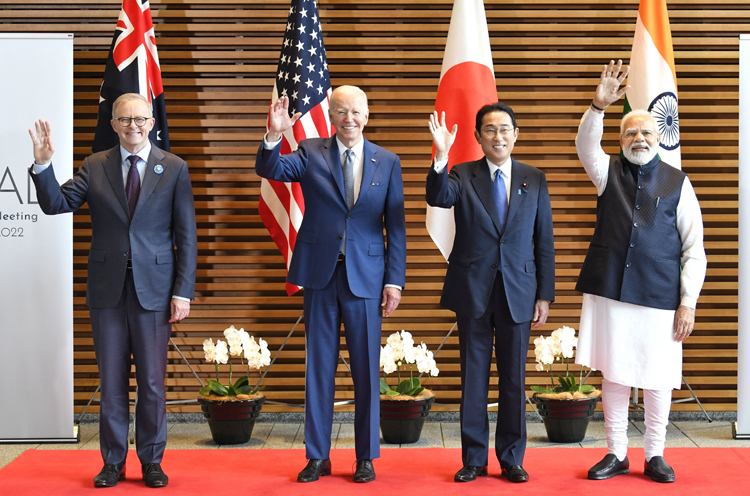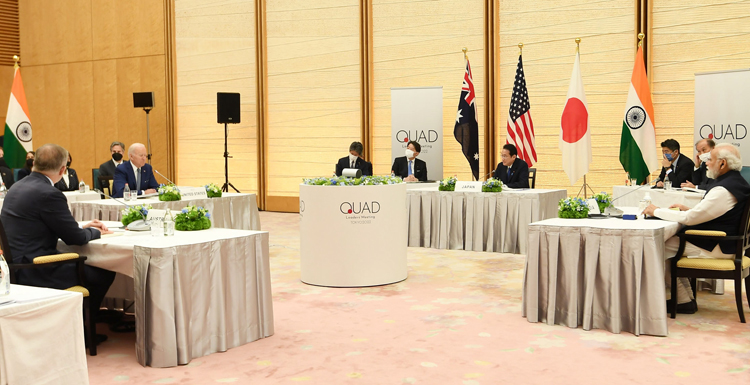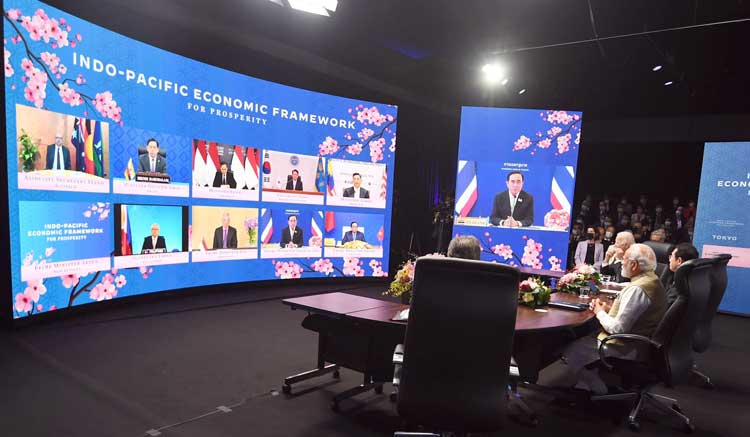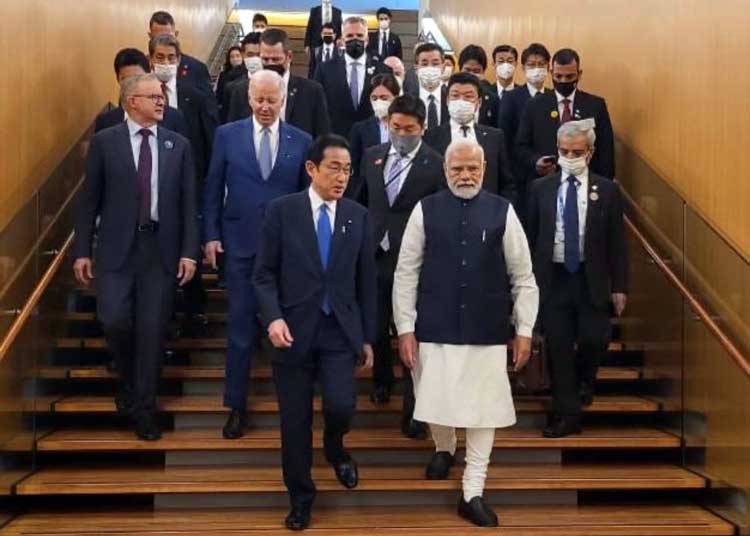INDIAN ARMED FORCES CHIEFS ON OUR RELENTLESS AND FOCUSED PUBLISHING EFFORTS

The insightful articles, inspiring narrations and analytical perspectives presented by the Editorial Team, establish an alluring connect with the reader. My compliments and best wishes to SP Guide Publications.

"Over the past 60 years, the growth of SP Guide Publications has mirrored the rising stature of Indian Navy. Its well-researched and informative magazines on Defence and Aerospace sector have served to shape an educated opinion of our military personnel, policy makers and the public alike. I wish SP's Publication team continued success, fair winds and following seas in all future endeavour!"

Since, its inception in 1964, SP Guide Publications has consistently demonstrated commitment to high-quality journalism in the aerospace and defence sectors, earning a well-deserved reputation as Asia's largest media house in this domain. I wish SP Guide Publications continued success in its pursuit of excellence.
- Prime Minister Modi Visits Punjab’s Adampur Air Base, Interacts with Airmen after Successful ‘Operation Sindoor’; Stern Message to Pakistan
- The layered Air Defence systems that worked superbly, the key element of Operation Sindoor
- Operation Sindoor | Day 2 DGMOs Briefing
- Operation Sindoor: India strikes back with Precision and Purpose
- Operation Sindoor: Resolute yet Restrained
- India’s Operation Sindoor Sends a Clear Message to Terror and the World – ‘ZERO TOLERANCE’
- Japan and India set forth a defence cooperation consultancy framework, talks on tank and jet engines
- Terrorist Attack in Pahalgam in Kashmir: Unfolding a long surgical war against PAK
- Lt General Pratik Sharma takes over Command of Indian Army's Northern Command
QUAD rattles China
The Tokyo QUAD summit has set up an Indo-Pacific Economic Framework (IPEF) which has over a dozen partner countries. These partner countries are situated around China and have strong trade relations with China, but by partnering with USA and other QUAD members, there will be a new trend among them to increase their trade commitments with IPEF partner countries, which naturally will be at the cost of trade and economic relations with China.

The historic Tokyo QUAD summit has dispelled the notion that QUAD group might not hold together for long as it lacked coherence. Yes, Ukraine crisis haunted QUAD unity, but during its fourth Summit (May 23-24, 2022), QUAD leaders displayed maturity and let the Ukraine issue be discussed in a constructive manner, without hurting the sentiments of fellow partners, in the interest of maintaining unity, to meet the bigger China challenge. In fact the Summit laid the foundation of a new expanded bloc of 13 countries, which can be dubbed as anti-China bloc of nations, for greater economic cooperation amongst themselves. The QUAD summit thus came out with a purposeful and action oriented agenda.With an institutionalised leader's summit, QUAD was able to present before the world a new agenda for peace, stability and security in the Indo-Pacific region. This will have a wide-ranging impact on the economic well-being of the small and big nations.
Earlier QUAD Summits
Infact, the quadrilateral alliance of the four nations - US, Australia, Japan and India seems to be in an unprecedented hurry to take actionable steps which can contain the rise of China. With four summit-level interactions in 14 months, QUAD has displayed its commitment to ensure peace and stability in the entire Indo-Pacific region. Perhaps the worldwide crisis generated by Corona pandemic and Russian military invasion of Ukraine has necessitated a co-ordinated response from the QUAD group.
With four summit-level interactions in 14 months, QUAD has displayed its commitment to ensure peace and stability in the entire Indo-Pacific region
The first QUAD summit was held in virtual format in March 2021, in the wake of corona scare all over the world and the need to urgently tackle this health crisis. The March 2021,virtual summit transformed the framework from one of dialogue to one of action, with a commitment to deliver one billion covid vaccines to the Indo-Pacific and established a working group on climate change and critical and emerging technologies. The second summit was hosted in-person by President Joe Biden in September 2021 and the third summit was again called virtually in March 2022.

The fourth Tokyo May summit demonstrated, at a time of profound global challenge, that the QUAD is a force for good, committed to bringing tangible benefits to the region. After the conclusion of the summit, the QUAD leaders jointly said that in our first year of cooperation, we established the QUAD's dedication to a positive and practical agenda; in our second year, we are committed to deliver on this promise, making the region more resilient for the 21st century."
Formation of IPEF
The QUAD Tokyo summit has perhaps achieved its desired objective of sending a strong message to China and its partner Russia, that unilateral action and policy of deception would not be tolerated. China no longer can take things for granted. It has been enjoying free run in South and East China sea without facing any meaningful challenge from littoral countries. China has been spreading its strategic tentacles through its economic muscle. Hence the Tokyo QUAD summit rightly focussed on preparing a blue print to tackle this economic challenge first. With this aim a firm step was taken to set up an Indo-Pacific Economic Framework (IPEF) which has over a dozen partner countries. These partner countries are- USA, India, Indonesia, Malaysia, Vietnam, South Korea, Japan, Philippines, Brunei, Australia, New Zealand, Singapore and Thailand.

Significantly most of these partner countries are situated around China. They have strong trade relations with China, but by partnering with USA and other QUAD members, there will be a new trend among them to increase their trade commitments with IPEF partner countries, which naturally will be at the cost of trade and economic relations with China. By bringing in these dozen countries, US is also ensuring that in future they gradually mould their China policy and reduce their dependence on China.
US has thus tried to resuscitate the String of Pearls Policy, which China practised in the beginning of this decade around India. China will thus be surrounded by a group of countries belonging to the rival camp. Naturally, after the QUAD decision to set up Indo-Pacific Economic Framework China has reacted feverishly.
Countering China
One of the biggest concerns of the international community has been China's Belt and Road initiative, through which China has been strengthening its strategic grip over distant regions and smaller island countries. The latest security pact China has been able to sign was with the Solomon Island, situated near Australia. This caused lot of consternation in the region. In view of this for the first time the QUAD leaders have come out with a solid program to present a more transparent alternative before the world's smaller developing countries.
In the backdrop of accusations against China that it has been sanctioning huge commercial loans to smaller countries in the name of assisting in the infrastructure development projects, QUAD leaders also have come out with an assistance program to cope with the debt issues under the G-20 Common Framework and by promoting debt sustainability and transparency in close collaboration with finance authorities of relevant countries, including through the "Quad Debt Management Resource Portal," which consists of multiple bilateral and multilateral capacity building assistance.
The looming China threat, exacerbated by unilateral Russian military action against Ukraine and Russian bonding with China in the Indo-Pacific region, has compelled the four nation alliance to consider ways and means to tackle the threat both at the economic and strategic level
Perhaps the looming China threat, exacerbated by unilateral Russian military action against Ukraine and Russian bonding with China in the Indo-Pacific region, has compelled the fournation alliance to consider ways and means to tackle the threat both at the economic and strategic level. The joint China Russia threat to peace and stability in the Indo-Pacific region was more than evident when both powerful communist giants conducted joint war drill near Sea of Japan and East China sea, when the four democratic powerhouses of the world were mulling over the steps to tackle the China threat. It is very clear that China is using Russia to achieve its strategic security aims in the Indo-Pacific.
Summit Joint Statement
Without naming China, the joint statement issued by QUAD summit made very obvious reference to the over two years military stand-off in the cold mountains of Eastern Ladakh, "We strongly oppose any coercive, provocative or unilateral actions that seek to change the status quo and increase tensions in the area, such as the militarisation of disputed features, the dangerous use of coast guard vessels and maritime militia, and efforts to disrupt other countries' offshore resource exploitation activities."

Taking note of the aggressive stance of China in South and East China sea, the QUAD leaders, reminded the Chinese leadership of the need to respect international law, particularly as reflected in the UN Convention on the Law of the Sea (UNCLOS), and the maintenance of freedom of navigation and overflight, to meet challenges to the maritime rules-based order, including in the East and South China Seas.
Indian concerns on cross border terrorism also found detailed mention in the joint statement, thus showing solidarity with India on the issue. The joint statement said, "We condemn unequivocally, terrorism and violent extremism in all its forms and manifestations and reiterate that there can be no justification for acts of terror on any grounds whatsoever. We denounce the use of terrorist proxies and emphasize the importance of denying any logistical, financial or military support to terrorist groups which could be used to launch or plan terror attacks, including cross-border attacks."
Supply Chain
To break the Chinese supply chain monopoly in high tech equipment, spare parts and raw material, the QUAD also took significant step to enable diversified sourcing of such high-tech goods by producing them in QUAD member and partner countries. To achieve this aim, QUAD had earlier decided to set up the Critical and Emerging Technologies group. This group will now undertake serious program to enhance the prosperity and security of the region. In the area of 5G and beyond, the QUAD leaders welcomed the Prague Proposals on Telecommunications Supplier Diversity, they also decided to advance interoperability and security through the signature of a new Memorandum of Cooperation on 5G Supplier diversity, including through Open RAN Track. The QUAD is also exploring ways to collaborate on the deployment of open and secure telecommunications technologies in the region.
To break the Chinese supply chain monopoly in high tech equipment, spare parts and raw material, the QUAD also took significant step to enable diversified sourcing of such high-tech goods by producing them in QUAD member and partner countries
The QUAD has also mapped their capacity and vulnerabilities in global semiconductor supply chains and have decided to better leverage the complementary strengths of QUAD members to realise a diverse and competitive market for semiconductors. The Common Statement of Principles on Critical Technology Supply Chains, launched on the occasion of this Summit, advances the cooperation on semiconductors and other critical technologies, providing a cooperative foundation for enhancing our resilience against various risks to the region. Cooperation in the international standardisation organisations, such as the Telecommunication Standardisation Bureau of the International Telecommunication Union, has made great progress, and they expect to strengthen such cooperation through the new International Standards Cooperation Network (ISCN). This cooperation will help ensure technology development in the region is guided by shared democratic values.
QUAD will continue to strengthen its horizon scanning cooperation following discussions in biotechnology through efforts on mapping and a corresponding Track 1.5 and a future focus on quantum technologies. To achieve these goals QUAD has also decided to convene a business and investment forum for networking with industry partners to expand capital for critical and emerging technologies.





